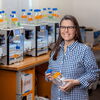MDI Bio Lab discoveries might advance heart repair
 Courtesy / Mount Desert Island Biological Laboratory
Voot Yin, MDI Biological Laboratory assistant professor. Yin says he has identified processes that underlie how heart tissue regenerates.
Courtesy / Mount Desert Island Biological Laboratory
Voot Yin, MDI Biological Laboratory assistant professor. Yin says he has identified processes that underlie how heart tissue regenerates.
An MDI Biological Laboratory assistant professor says he has identified processes that underlie how heart tissue regenerates, which in turn holds out hope of finding new drugs that can help the body grow muscle cells and get rid of scar tissue, two important steps in tissue repair.
The researchers are using the zebrafish to study how heart tissue regenerates because the fish have what they called an “amazing capacity” to regenerate the form and function of almost any of their body parts.
Voot Yin, an assistant professor leading the research at the Bar Harbor lab, said adult humans and other mammals currently have limited abilities to regrow damaged parts, but learning more about why zebrafish, salamanders and other lower animals can do this more easily might one day help scientists devise drugs to stimulate similar pathways in humans.
“Although zebrafish look quite different from humans, they share an astonishing 70% of their genetic material with humans, including genes important for the formation of new heart muscle,” Yin said in a statement. “These genes are conserved in humans and other mammals, but their activity is regulated differently after an injury like a heart attack.”
Yin and MDI Bio Lab president Kevin Strange were both Mainebiz 2013 Next award winners. That same year the two spun off the first company in the lab’s 115-year history. That company, Novo Biosciences Inc., is examining the therapeutic potential of drugs that speed tissue healing and stimulate the regeneration of lost and damaged body parts first in animals, with the goal of one day using the technology in humans.
About 610,000 people die of heart disease in the United States, accounting for one in four deaths. Centers for Disease Control and Prevention statistics show.
Yin’s work builds on earlier work identifying an experimental drug called ZF143 that hastens the rate of tissue repair in damaged heart and limb tissue. Novo is working to move that experimental drug forward for potential use in humans.
His new research, published in the journal “Development” with co-authors Megan Beauchemin and Ashley Smith, focuses on a central genetic regulator called miR-101a in stimulating heart muscle cell growth and removing scar tissue. Yin described the two functions as the “yin and yang” of heart tissue regeneration. That’s because scar tissue does serve as an immediate Band-Aid but later prevents the heart from beating properly, so it has to be removed at some point so tissue can be restored.
Yin noted that with a better understanding of the genetic underpinnings that lead to tissue regeneration, he and his team may be able to develop new drug candidates that control the activity of the genetic circuits and repair damaged hearts. Other possible applications of the research are in diseases involving muscle damage, including muscular dystrophy, according to the lab.
Read more
MDI lab launches regenerative tissue spinoff
MDI lab gets $18M grant for biomedical research, workforce training
MDI Bio Lab awarded $20K for aging research program
MDI Biological Lab finds new way to heal wounds
MDIBL scientists study ‘ocean Methuselahs’ to learn about aging
MDI Bio Lab president stepping down in 2018
MDI Bio Lab scientists score patent for heart repair medicine










Comments